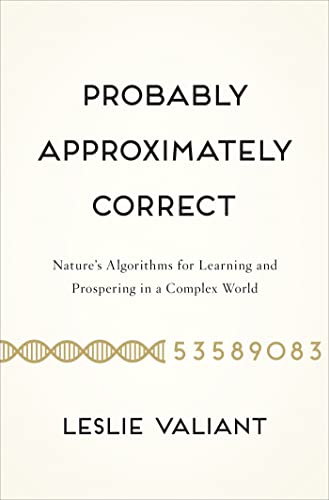Probably Approximately Correct
Nature's Algorithms for Learning and Prospering in a Complex World
Leslie Valiant
BOOK REVIEW

In a world teeming with complexity and uncertainty, Probably Approximately Correct: Nature's Algorithms for Learning and Prospering in a Complex World by Leslie Valiant emerges as an intellectual beacon. This gem of a work invites readers to embark on a thrilling ride through the fascinating intersection of computer science, biology, and artificial intelligence, offering insights that are nothing short of revolutionary.
Valiant, a towering figure in the realms of computational learning theory and the mind behind the profound concept of probably approximately correct (PAC) learning, does not merely scratch the surface; he digs deep into the very fabric of what makes learning and adaptation possible in the natural world. Imagine a framework that not only explains how organisms adapt to their environments but also how these principles can be elegantly translated into algorithms. This is where Valiant weaves a tapestry of ideas that speaks to both scientists and laypersons alike, infusing each page with a sense of wonder and urgency.
His premise is bold: the algorithms we encounter in nature are not just random occurrences but are intricately designed mechanisms that foster survival and prosperity. This notion compels you to reassess everything you thought you knew about intelligence, not just in humans but across the spectrum of life. Can humans learn from the very DNA of nature's algorithms? Absolutely. And Valiant doesn't hold back on revealing the potential implications of applying these biological strategies to technology, business, and ultimately, to how we navigate our complex lives.
Readers have passionately engaged with Valiant's transformative ideas. Some have praised the book for its ability to bridge multiple disciplines, while others have found its theoretical rigor both intimidating and invigorating. "It's a challenging read," one reviewer noted, "but the payoff is immense if you can grasp Valiant's visions on adaptation." In a world where misinformation can spread like wildfire, Valiant's insistence on grounded, algorithmic truth strikes a much-needed chord.
As you read, prepare for moments of sheer revelation interspersed with intellectual rigor. Valiant doesn't shy away from the uncomfortable questions that arise when we attempt to apply these algorithms to human society. What are the ethical implications of mimicking natural selection in our technological advancements? He wades into these murky waters with an acuteness that is seldom seen in formal academic discourse, daring you to reconsider the ethical paradigms framing our understanding of progress.
But perhaps the most compelling aspect of the work is its urgency. In a time when artificial intelligence is reshaping the fabric of society, understanding these natural learning algorithms is more crucial than ever. Valiant expertly teases apart the complexities involved, compelling us to grasp the necessity of such knowledge for both technologists and decision-makers. The stakes couldn't be higher: we stand at the precipice of an age where our ability to prosper depends on a sophisticated understanding of the algorithms of nature.
As the pages turn, you're not just absorbing information; you're embarking on a journey of emotional and intellectual discovery. Valiant's language flows seamlessly, pulling you deeper into the multifaceted connections between the natural world and our potential futures. It's an invitation to dream big; to envision a world where we harness these algorithms for the greater good, rather than succumb to the chaotic unpredictability that often clouds our path forward.
Critics have articulated a myriad of concerns regarding the minimal hand-holding Valiant provides. For some, the complexity of the ideas may feel daunting, a linguistic fortress that requires equally formidable intellectual armaments to breach. However, this very challenge can invigorate the reader, planting seeds of curiosity that flourish into a deeper understanding of not just the book, but the world around us.
So, are you ready to dive headfirst into the windswept waters of Probably Approximately Correct? This is more than just a read; it's an exploration that promises to transform the way you view the intertwining of nature and technology in your daily life. Valiant's work could very well articulate the principles that will govern our existence as we move forward through the labyrinth of modernity. Failure to engage with these ideas may not just mean missing out on knowledge but risk remaining adrift amid a sea of ignorance. 🌍
As you clutch this transformative book, remember this: the future isn't just something that happens to us; it's something we can create by understanding the fundamental algorithms of nature. Trust me, you won't want to miss it.
📖 Probably Approximately Correct: Nature's Algorithms for Learning and Prospering in a Complex World
✍ by Leslie Valiant
🧾 208 pages
2013
#probably #approximately #correct #natures #algorithms #learning #prospering #complex #world #leslie #valiant #LeslieValiant